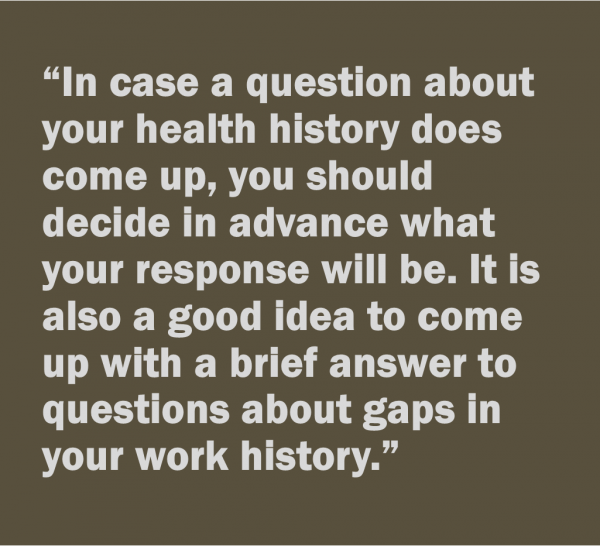PERSPECTIVE: On the Job Hunt After Cancer
/by Julie Jansen A recent Harris Poll survey conducted on behalf of Cancer and Careers (CancerAndCareers.org) found that 78% of the cancer survivors surveyed were concerned that their cancer diagnosis would hinder their ability to find a new job. For many survivors, job hunting after cancer proves to be a challenging experience. However, you can rest assured that if you are qualified for a job, an employer cannot refuse to hire you simply because you have had cancer.
If you are one of those survivors who is back on the job market after battling cancer, here are some tips to help make your job search a success.
Spiff Up Your Resume
The primary goal of your resume is to describe your experience and achievements in a way that makes a prospective employer want to set up an interview with you to talk about how you can do the same great things for them. A resume is not a job description. So keep lists of tasks and responsibilities short and to the point. Instead, your resume should focus more on your accomplishments and how you were able to make a positive difference to your department or company. A bulleted format works best for this part of your resume.
Another important element of a contemporary resume is a profile or summary, which is a brief paragraph at the top of your resume that summarizes your work experience. Your summary can be used to add a bit of personality to your resume. This is a good place to list the unique qualities that make you the right fit for the job.
Most companies use applicant-tracking software to scan your resume’s keywords before a human reads it. So it’s important to add the right keywords to your resume. Use technical or functional descriptors such as project management, event planning, and website design, rather than clichéd phrases like effective communicator and team player.
Absolutely add volunteer experience to your resume, especially if you have an employment gap because you took time off for treatment or had to leave your job. Include a list of achievements for your volunteer experience, just as you would for your paid jobs.
Finally, despite the persistent myth that a resume should only be one page, if you have worked for two or more years, then a two-page resume is the new rule of thumb.
Prepare for the Interview
Interviewing for a new job is nerve wracking for most people, with or without a cancer history. Preparation is the key to feeling more comfortable and confident during the interview process – and to getting invited back for that second interview.
The most important thing an employer is looking for during the interview process is how you, the job candidate, can solve their problems and meet their needs. Research the company as much as you can so that you can incorporate your knowledge of the company into the interview. This will also help you to ask smart, thoughtful questions about the job you’re applying for.
Prepare answers to the standard questions that are often asked during an interview, for example:
- Tell me about yourself.
- What are your strengths and weaknesses?
- Describe a time when you failed.
 When answering, tell stories about your achievements and use concrete examples – but keep your answers brief and meaningful. Stay composed, and don’t let an interviewer’s quirky questions rattle you. Unless a question or request is discriminatory, just go with the flow.
When answering, tell stories about your achievements and use concrete examples – but keep your answers brief and meaningful. Stay composed, and don’t let an interviewer’s quirky questions rattle you. Unless a question or request is discriminatory, just go with the flow.
Speaking of discrimination, you are not obligated to share the fact that you had cancer. And a prospective employer legally cannot ask you this question. However, in case a question about your health history does come up, you should decide in advance what your response will be. It is also a good idea to come up with a brief answer to questions about gaps in your work history.
If you are asked an uncomfortable question, try not to ramble. Instead, turn the conversation back to how you can make a positive difference for your potential employer.
The thought of looking for employment after cancer can be a frightening one. However, the good news is that many companies are hiring, and now that you are armed with these job- hunting tips, you’re more prepared than ever to land that job you’re after.
______________________________________
Julie Jansen is a career coach, resume and LinkedIn profile writer, and the author of I Don’t Know What I Want, But I Know It’s Not This: A Step-By-Step Guide to Finding Gratifying Work. She is a graduate of the University of Hartford. This article first appeared in Coping magazine. Her website is JulieJansen.net.































